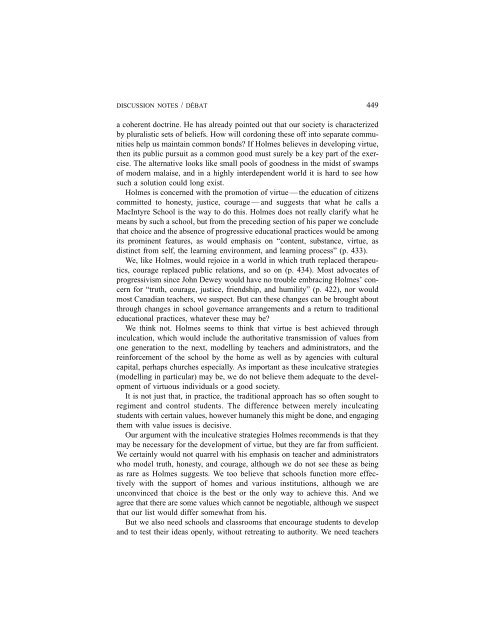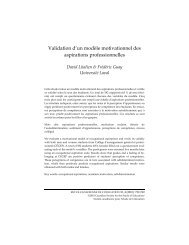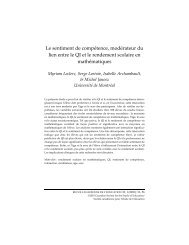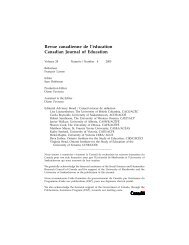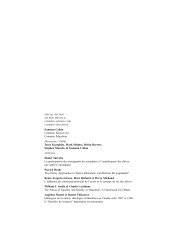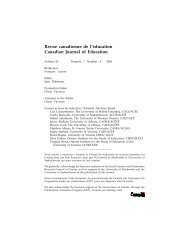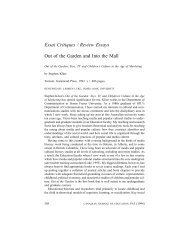Mireille Falardeau et Michel Loranger Le choix de stratégies ... - CSSE
Mireille Falardeau et Michel Loranger Le choix de stratégies ... - CSSE
Mireille Falardeau et Michel Loranger Le choix de stratégies ... - CSSE
Create successful ePaper yourself
Turn your PDF publications into a flip-book with our unique Google optimized e-Paper software.
DISCUSSION NOTES / DÉBAT 449<br />
a coherent doctrine. He has already pointed out that our soci<strong>et</strong>y is characterized<br />
by pluralistic s<strong>et</strong>s of beliefs. How will cordoning these off into separate communities<br />
help us maintain common bonds? If Holmes believes in <strong>de</strong>veloping virtue,<br />
then its public pursuit as a common good must surely be a key part of the exercise.<br />
The alternative looks like small pools of goodness in the midst of swamps<br />
of mo<strong>de</strong>rn malaise, and in a highly inter<strong>de</strong>pen<strong>de</strong>nt world it is hard to see how<br />
such a solution could long exist.<br />
Holmes is concerned with the promotion of virtue — the education of citizens<br />
committed to honesty, justice, courage — and suggests that what he calls a<br />
MacIntyre School is the way to do this. Holmes does not really clarify what he<br />
means by such a school, but from the preceding section of his paper we conclu<strong>de</strong><br />
that choice and the absence of progressive educational practices would be among<br />
its prominent features, as would emphasis on “content, substance, virtue, as<br />
distinct from self, the learning environment, and learning process” (p. 433).<br />
We, like Holmes, would rejoice in a world in which truth replaced therapeutics,<br />
courage replaced public relations, and so on (p. 434). Most advocates of<br />
progressivism since John Dewey would have no trouble embracing Holmes’ concern<br />
for “truth, courage, justice, friendship, and humility” (p. 422), nor would<br />
most Canadian teachers, we suspect. But can these changes can be brought about<br />
through changes in school governance arrangements and a r<strong>et</strong>urn to traditional<br />
educational practices, whatever these may be?<br />
We think not. Holmes seems to think that virtue is best achieved through<br />
inculcation, which would inclu<strong>de</strong> the authoritative transmission of values from<br />
one generation to the next, mo<strong>de</strong>lling by teachers and administrators, and the<br />
reinforcement of the school by the home as well as by agencies with cultural<br />
capital, perhaps churches especially. As important as these inculcative strategies<br />
(mo<strong>de</strong>lling in particular) may be, we do not believe them a<strong>de</strong>quate to the <strong>de</strong>velopment<br />
of virtuous individuals or a good soci<strong>et</strong>y.<br />
It is not just that, in practice, the traditional approach has so often sought to<br />
regiment and control stu<strong>de</strong>nts. The difference b<strong>et</strong>ween merely inculcating<br />
stu<strong>de</strong>nts with certain values, however humanely this might be done, and engaging<br />
them with value issues is <strong>de</strong>cisive.<br />
Our argument with the inculcative strategies Holmes recommends is that they<br />
may be necessary for the <strong>de</strong>velopment of virtue, but they are far from sufficient.<br />
We certainly would not quarrel with his emphasis on teacher and administrators<br />
who mo<strong>de</strong>l truth, honesty, and courage, although we do not see these as being<br />
as rare as Holmes suggests. We too believe that schools function more effectively<br />
with the support of homes and various institutions, although we are<br />
unconvinced that choice is the best or the only way to achieve this. And we<br />
agree that there are some values which cannot be negotiable, although we suspect<br />
that our list would differ somewhat from his.<br />
But we also need schools and classrooms that encourage stu<strong>de</strong>nts to <strong>de</strong>velop<br />
and to test their i<strong>de</strong>as openly, without r<strong>et</strong>reating to authority. We need teachers


